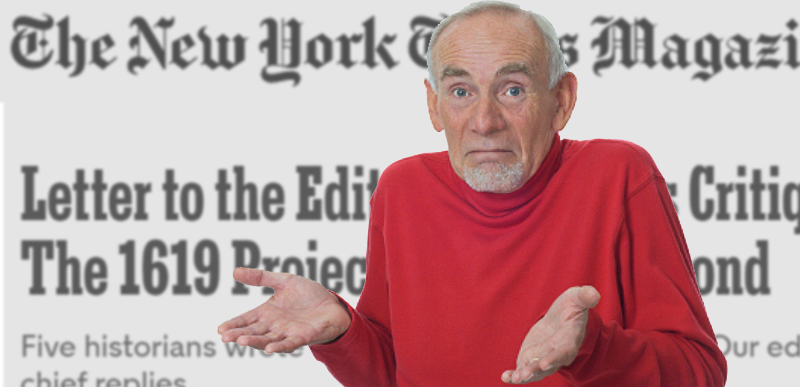The 1619 Project from the New York Times has been under fire since it began. And I’m not talking about by racists or people with political agendas. It’s been under attack from historians, for not being accurate.
In fact, a group of historians wrote a detailed Letter to the Editor explaining the factual problems with the project, which is an obvious attempt at politicizing the past in modern terms for partisan gain.
Of course, the historians said it better than that. In fact, this particular group of historians said it so well that the New York Times published their letter to the editor.
And promptly responded “nuts to that.”
It’s pretty amazing. As Twitter was swift in pointing out.
This is astonishing. https://t.co/6N2htXJVKz
— PEG (@pegobry) December 21, 2019
In some ways it’s actually good. This is an official statement by the NYT that they no longer consider facts relevant to their reporting. Falsehoods will no longer be corrected if they are in support of progressive ideology. Glad they put it on the record!
— PEG (@pegobry) December 21, 2019
The same newspaper that regularly dumps on US and UK voters for being anti-intellectual and not listening to the "experts" when elections don't go their way now insists they know better than the experts. pic.twitter.com/kuLpAKRsIX
— Mark Grabowski (@ProfGrabowski) December 21, 2019
If you’re hitting a paywall, don’t worry. Here are the highlights.
From the historians.
We write as historians to express our strong reservations about important aspects of The 1619 Project. The project is intended to offer a new version of American history in which slavery and white supremacy become the dominant organizing themes. The Times has announced ambitious plans to make the project available to schools in the form of curriculums and related instructional material.
We applaud all efforts to address the enduring centrality of slavery and racism to our history. Some of us have devoted our entire professional lives to those efforts, and all of us have worked hard to advance them. Raising profound, unsettling questions about slavery and the nation’s past and present, as The 1619 Project does, is a praiseworthy and urgent public service. Nevertheless, we are dismayed at some of the factual errors in the project and the closed process behind it.
These errors, which concern major events, cannot be described as interpretation or “framing.” They are matters of verifiable fact, which are the foundation of both honest scholarship and honest journalism. They suggest a displacement of historical understanding by ideology. Dismissal of objections on racial grounds — that they are the objections of only “white historians” — has affirmed that displacement.
Please note “we write as historians” and “These errors, which concern major events, cannot be described as interpretation or “framing.” They are matters of verifiable fact” because those lines are important when you read the following in the Times response.
We are not ourselves historians, it is true. We are journalists, trained to look at current events and situations and ask the question: Why is this the way it is? In the case of the persistent racism and inequality that plague this country, the answer to that question led us inexorably into the past — and not just for this project. The project’s creator, Nikole Hannah-Jones, a staff writer at the magazine, has consistently used history to inform her journalism, primarily in her work on educational segregation (work for which she has been recognized with numerous honors, including a MacArthur Fellowship).
…
As the five letter writers well know, there are often debates, even among subject-area experts, about how to see the past. Historical understanding is not fixed; it is constantly being adjusted by new scholarship and new voices. Within the world of academic history, differing views exist, if not over what precisely happened, then about why it happened, who made it happen, how to interpret the motivations of historical actors and what it all means.
The actual historians, scholars who are concerned with facts, say “we are not talking about things to be interpreted but rather about matters of actual, verifiable facts”, and the NYT is all “well we are NOT historians but also isn’t really just a matter of interpretation and whatever?”
PEG is right. Astonishing.
And present it as objective scholarship, the real history, the true founding. That’s the trick. Silverstein basically said that they were engaged in propaganda based on their ideology which is, at least, refreshingly honest.
— Andrew Sullivan (@sullydish) December 21, 2019
Yeeeup. That’s it right there.

